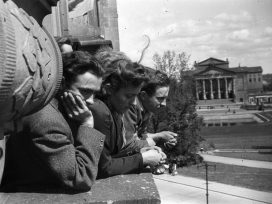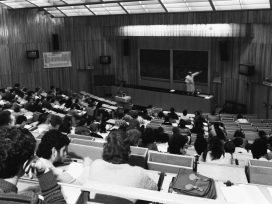What are the interests that lie behind the fragmentation and expansion of the Slovenian higher education system? Is the growth in the number of departments and universities grounded in the good intention to improve the choice and quality of studies, with the privatization and “relaxedness” of higher education, as we might call it, if relaxedness (i.e. “sproschenost”, the unusual political and ideological goal of the ruling coalition in Slovenia) has not in the face of the scorn of its opponents become a dead slogan of the current rulers? It appears that it is not. Historian Janko Prunk, who has otherwise been a great sympathizer with the current rulers, was scathingly critical when he resigned from the Council for Higher Education due to what he called the “tycoonization of higher education”, a process which he charged was being run by friends of the current administration (who are, or were, also his own friends). The use of this word hurt, since the battle against “tycoons” is currently the hottest demagogic political game being played by Prime Minister Janez Jansa. “I am outraged over the poaching going on in the establishment of new schools, which is leading to the tycoonization of the higher education system,” said Prunk.
How to explain this phenomenon with its strange etymology that he is referring to? We can try with an example of what has in recent weeks been obsessing a good portion of Slovenian political and economic policy-making, which is faced with a “pragmatic” problem – yes, pragmatism here is merely a euphemism – regarding whether or not to recognize the independence of Kosovo, since doing so would jeopardize Slovenia’s good economic ties with Serbia. Hence out comes the old ideological fable which the regime likes to serve up, i.e. the one about national interest. Confronted with the apparent dilemma of preserving economic benefits or acting in a principled way and at least for a moment forgetting about economic benefit, the majority of people do not find their way very easily. As if acting on principle did not begin exactly at that point where personal interest is set aside. And as if, mutatis mutandis, this did not apply equally well to the state and its “national interest” – what it means to show principled and clear support for Kosovo for Slovenes could be a more easily resolved enigma if for no other reason than that we encountered similar doubts among a number of countries, and in the end also experienced a brief war, in the course of our own process of independence.
That the actions of politicians and individuals have in recent years become explicitly self-interested does not need to be exposed to the test of our doubt. Similarly with national interest. The problem arises once we realize that national interest is a popular ideological slogan and rhetorical flourish, which can be arbitrarily filled with a number of different meanings. The concept collapses when it is rolled out as relevant but, on closer examination, is exposed as consisting merely of private interest masquerading as national interest. The privatization of Slovenian education is a fine example of this. When the prime minister announced his crackdown on “tycoons”, which in essence was just a witch-hunt and a bit of theatre for public consumption, he likely did not anticipate that his partners and he himself would in time be revealed as belonging in that category. In his election campaign promises the prime minister talked of how we need “relaxed schools which will prepare young people for real life.” This empty ideological slogan par excellence of course assumes that our schools are out of touch with real life and that non-relaxedness is here a synonym for such a quality. His proposed solution was to announce the “modernization of education, which must come out as quickly as possible from the stuffy shadow of [previous Minister of Education Slavko] Gaber into the European sun.”
The unregulated privatization of higher education is a crystal clear case of abusing the national interest to advance one’s own private interests (and this under the European sun), if we can just prove that the latter predominate over the former. In order to more easily understand who the resigning member of the Council has in mind as “tycoon”, we would need to hear a name. But here Prunk was not forthcoming, even though the candidate for this position is fairly self-evident. The founders of new private faculties are not that numerous. SDS (Slovenian Democratic Party) ideologue Peter Jambrek, always at the head of the national programs of Nova revija when these were written for the right-wing parties, including Jansa’s SDS, president of the Zbor za republiko (Rally for the Republic), and in recent years also president of the Council for Higher Education, founded the Faculty of Postgraduate State and European Studies in Brdo pri Kranju. Then he was behind two more: the Faculty of Applied Social Studies (FUDS) and the European Law Faculty. Just recently he came out with an initiative to merge the above-mentioned faculties into the first private university in Slovenia. And at that point, just before a decision was taken, Prunk resigned. He has denied that his criticism has anything to do with Jambrek, but it is impossible to escape the impression that the diagnosis with the help of this now disreputable title applies to him as well.
If Jansa is a newly minted ideologue railing against the rich, i.e. against those who made it big during the period of transition and privatization, who made their money illegally or by exploiting loopholes in the system, then Jambrek in his various articulations is undeniably an ideologue of relaxedness, an ideologem which was born in the Nova revija environment and which the right-wing parties adopted as their political slogan and platform. Thus as his last mandate began with another slogan, it finishes with the first. The truth of relaxed government has been perverted into a shogunate. The word “tycoon” is itself of Japanese origin and it is the nickname of shoguns, the Japanese generals of old. The call for openness and freedom, “spiritual relief”, which is hidden behind relaxedness, has turned into nothing less than a battle cry. But with Prunk’s criticism the first has turned against the second, and the very ideologue of relaxedness has been accused of being a “tycoon.” True, just entering into the game of ideologies into which they have invited and trapped us is a danger. The battle against tycoons would be legitimate to the extent that such tycoons really do exist and the same standard is applied to all of them. But the economic ones are more or less predominately driven by their own interest, while the school and university ones, though also clearly driven by their personal interest, advance it under the guise of the national. If the slogan of relaxation of (higher) education is in the idea of privatization, then privatization has gone wild and has again been divided into ours and yours. When ours is privatized, this is allowed. When yours is privatized, it isn’t. And thus as we first got “relaxed” and “unrelaxed” citizens, institutions, and systems, it now appears that we will get the right and the wrong kinds of tycoons and tycoon systems. It is not just that we are witness to bizarre auctions, wishful thinking and predicted wars (against media, for example), the final truth of this kind of behavior is its unprincipledness. A benevolent interpretation of relaxedness would in the face of conceptual bizarreness probably only be possible if the authors took it seriously, whatever that means. But both concepts, together with their authors, give up at the moment when we put them in the context of the place where they are implemented and look at how seriously their implementers take them. Thus Prunk should be given recognition for finding the courage to put the word in its right place.






